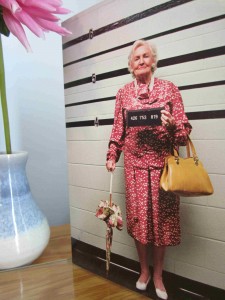 A couple weeks ago I posted a blog about overhearing an 80-year-old woman talking in my dentist’s office about her plans to do the next thing on her bucket list the following day: go skydiving.
A couple weeks ago I posted a blog about overhearing an 80-year-old woman talking in my dentist’s office about her plans to do the next thing on her bucket list the following day: go skydiving.
This week I’d like to share a delightful coincidence that occurred while I was writing that post.
I’d gotten my first draft done Monday morning and then stopped for lunch, and after I ate I stepped outside to get the mail. There, tucked between the bills and the fund-raising appeals, was a handwritten envelop, a rarity I always welcome.
I recognized the handwriting as my friend Susan’s, who was away on vacation, and when I opened the envelop and pulled out the card I laughed out loud. On the front of it was a picture of a well-dressed, dignified older woman posing for her mugshot.
I figured the reason Susan had sent me this card was that I was arrested once (well, okay, more than once) for doing nonviolent civil disobedience, and after one of those arrests Susan came to visit me while I was doing a week in jail.
But when I opened the card I laughed even harder. Inside it read: “Here’s to another check on the bucket list!”Continue Reading






